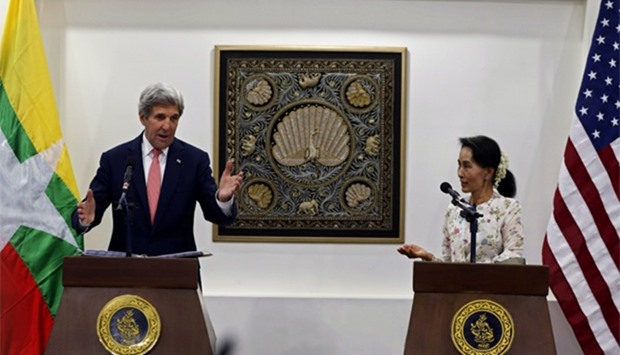In the first high-level meeting with Suu Kyi and her administration since it took office in March, Kerry told the Nobel laureate her country's evolution towards democracy after decades under the military served as a beacon of hope.
‘Today my message is very, very simple: we strongly support the democratic transition that is taking place here,’ he told reporters at a joint press conference with her in the capital Naypyidaw.
Historic elections in November swept Suu Kyi and her party into office and effectively ended half a century of military rule.
Kerry applauded the process as a ‘remarkable statement to people all over the world’.
As a reward for holding the peaceful election, Washington last week lifted a host of financial and trade embargoes.
But it has kept the backbone of its sanctions as well as a blacklist of cronies and businesses close to the former junta as leverage.
Suu Kyi said she welcomed the ‘scrutiny’ inherent in the remaining sanctions.
‘If we are going along the right path all sanctions will be lifted in good time,’ she added.
The veteran activist, whose decades-long struggle against the generals won the world's admiration, draws on much political capital in Washington.
She now serves as Myanmar's foreign minister, while also holding the new position of state counsellor that puts her at the helm of government in defiance of an army-drafted constitution barring her from the presidency.
That role is now held by her longtime ally Htin Kyaw.
In addition to November's election, reforms so far have seen hundreds of political prisoners freed, the press unshackled from censorship and foreign investment flood into a country cut off from the world for so long by paranoid generals.
As he enters the twilight of his term in office, US President Barack Obama is doubling down on his ‘Asia pivot’ -- a diplomatic strategy to engage the continent's leaders and tap its growing economies.
- Tension remains -
Before leaving, Kerry also met army chief Min Aung Hlaing as Washington looks to encourage further democratisation moves.
The pair discussed ‘implementing multi-party democracy’ and easing rebel conflicts, according to a post by the top general on his official Facebook page.
The army retains significant economic interests and political clout under a charter it scripted -- including a quarter of all parliamentary seats and control of key security ministries.
Myanmar faces other huge challenges, including decrepit infrastructure, conflicts in resource-rich borderlands, religious tensions and the continued influence of the army and junta-era cronies, who still dominate the economy.
US investment in Myanmar remains relatively low, although some US companies including Coca-Cola and Pepsi have already established a sales presence.
Last week Washington rolled back more sanctions, opening up all Myanmar banks to American business, while also extending indefinitely permission for firms to import through Myanmar's ports and airports -- many of which are operated by cronies still on the blacklist.
But tension points remain.
In recent weeks Washington has come under pressure from hardline Buddhists after the US embassy used the term ‘Rohingya’ to refer to the persecuted Muslim minority in the western state of Rakhine.
The term is incendiary to Buddhist nationalists who label the group ‘Bengalis’ and view them as illegal immigrants from Bangladesh.
More than 100,000 Rohinyga languish in displacement camps following sectarian violence in 2012.
Suu Kyi has drawn international flak for failing to use her moral force to speak up for the persecuted group.
Questioned on the issue, Suu Kyi called for ‘space’ to let the bitter communal hatreds heal and said debate over the use of the term 'Rohingya' would only fuel fires.
Kerry recognised the highwire act Suu Kyi must perform to avoid inflaming tensions but added: ‘We all understand... that there is a group here in Myanmar that calls itself Rohingya.’
He now joins Obama in Vietnam for a three-day visit likely to focus on trade, security and human rights.

